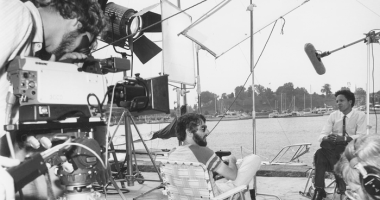Cas Mudde is one of the world’s leading experts on the far right, a movement about which he has written seven books and has been following closely from a young age. His contribution helps us to put into context and understand what stripe of far right we’re dealing with at a time in which these parties are generally the third biggest in terms of votes in many Western countries. On the occasion of Orwell Day 2023, we talk with him about the rise of this movement.
In this interview, Cas Mudde, talks about how he started to take an interest in the far right 40 years ago, in Holland, “when in 1982, a small party, and by today’s standards not particularly right-wing, got into the Dutch parliament. I was fifteen, and in Holland it started a huge obsession with the extreme right, not so much with the movement itself, but with the emotions and fears it aroused. This was a key factor in my interest.” The other factor is his brother, Tim Mudde, the Dutch far-right activist – the brother to whom he dedicates a few lines in the foreword to the book The Ideology of the Extreme Right: “A final thanks goes out to Tim Mudde, who has made my scholarly work both difficult and possible. I am grateful for all the help he has extended to me, and even more for the fact that we still respect each other despite our differences of opinion.” And they do have differences of opinion – while Tim has been convicted of hate crimes, Cas has to watch how his students in the US sign up for his classes behind the backs of their Trump-voter parents, who don’t want their children taking the classes of the left-wing European teacher to be told, as they are, that Trump is just another example of the new far-right, so far removed from the image of the Nazis that, unless you look closely, you can’t see the connection. But it’s there.
We have met Mudde on three occasions. Firstly, through his books, especially The Far Right Today, which helps the reader understand the evolution of the leaders, voters and parties of a movement, the extreme right, that is here to stay. The second occasion was on the phone, when he was in the Southern United States and we talking hands-free while driving through the Catalan Pyrenees, to discuss the presentation of The Far Right Today in Catalan. The last time, some months later, was in the courtyard of the CCCB, where Mudde showed up wearing shorts, comfy sandals and an affable expression, after a media tour of Europe and the city of Barcelona, and after having packed out the conference at the CCCB. Mudde fills auditoriums because people are keen to find out about a movement that he has divided into four, well-differentiated phases, as he explained to us in 2020 in the aforementioned interview: “The first wave (1945-1955) started after the Second World War and was made up of neo-fascist organisations, born out of the regimes of the 30s and 40s. The second wave was the right-wing populism of the 1950s and 60s, a blurry period that encompassed both the old ideology and the new. It wasn’t until the third wave (1980-2000) that the phenomenon became entirely new, with figures and themes unconnected with the Second World War. This was the explosion of parties such as France’s National Front (FN), the Freedom Party of Austria (FPÖ) and the Flemish Vlaams Blok. Far-right parties that got into parliaments, but found themselves isolated and unable to form governments. This changed in 2000.”
The year 2000 saw the start of the fourth wave, in which we still find ourselves. This was the moment when the far-right parties became the third largest in terms of votes in most European countries, and when in many cases, their ideas were seen as quite normal. This means “not just that political parties that are far right are seen as normal political parties but that their ideas, some of the core ideas, for example, that immigration threatens national identity and security are seen as common sense. The fourth wave is characterised by the fact that the far right is the dominant current, which means that both its ideas and its figures form part of it. That the far right has gone global. It’s not only a European phenomenon, we see far-right politics especially in North and South America, as well as some Asian countries. And we see that the far right is normalised.”
A classic error in judging today’s far right is to describe them as if they were 1940s neo-Nazis. This is not the case. Mudde makes a clear distinction between the extreme right and the radical right. Both are part of the far right, but with different characteristics: “When you think about the extreme right, you think about Franco or Falange, people who didn’t believe in democracy, who believed that a leader should lead. But the radical right is more like Vox, people who believe that the people should elect their own leaders. You would have democratic rule. However, they have a very monist interpretation of the people, they believe that the nation has one type of interest and values, just one. And therefore they don’t accept minority rights. They don’t accept rule of law, separation of powers, which are like building blocks of liberal democracy. […] The traditional far right leader we think about is this kind of macho man, brutal, someone like Jean-Marie Le Pen, a war veteran who is sexist and openly racist, or even Donald Trump or Bolsonaro. But actually a lot of our leaders of the far right are not even men, like Giorgia Meloni or Marine Le Pen. Or they are men like Jimmie Åkesson, of the Sweden Democrats, who look like eternal students types.”
And not just that. Many far-right leaders are black or gay, something that would have been inconceivable in the 1940s: “Everyone has met a misogynistic woman. Or Jews who are self-hating and use anti-Semitic stereotypes. Or homophobic gays. In other words, if you live in a racist world, you internalise racism. And the kind of nativism that we have today is in many cases focused on Islam, which has created an opportunity for non-Muslim non-whites,” says Mudde.
Mudde has also studied the supporters of the far right, who have gone from being violent militants in the 1940s, to minority voters, many of them white working class, in the 1980s, to now forming a voluminous body, already the third largest, and in which a cross-section of society is present rather than mainly just the white working class. “We know from decades and decades of research is that one thing always stands out, and that voters of the radical right not only have strongly negative attitudes towards immigration and immigrants, but that also this issue is very important for them. The first and foremost reason why people vote for the far right is cultural backlash. They oppose immigration, they oppose multicultural society.”
In the courtyard of the CCCB, to finish up, Mudde explains that the Spanish State has slightly less voters of the far-right party, Vox, than the European average, but that the most dangerous feature is that the main party, the PP, immediately made a deal with the far-right. It didn’t isolate them. “In most other countries, this took decades. Of course, Vox does come out of the PP, and we call that a “reputational shield”. Radical right parties that come out of the mainstream tend to get away with more, because they’re still seen as conservatives at heart, who just provoke a bit, who sound more extreme than they really are.”




Leave a comment